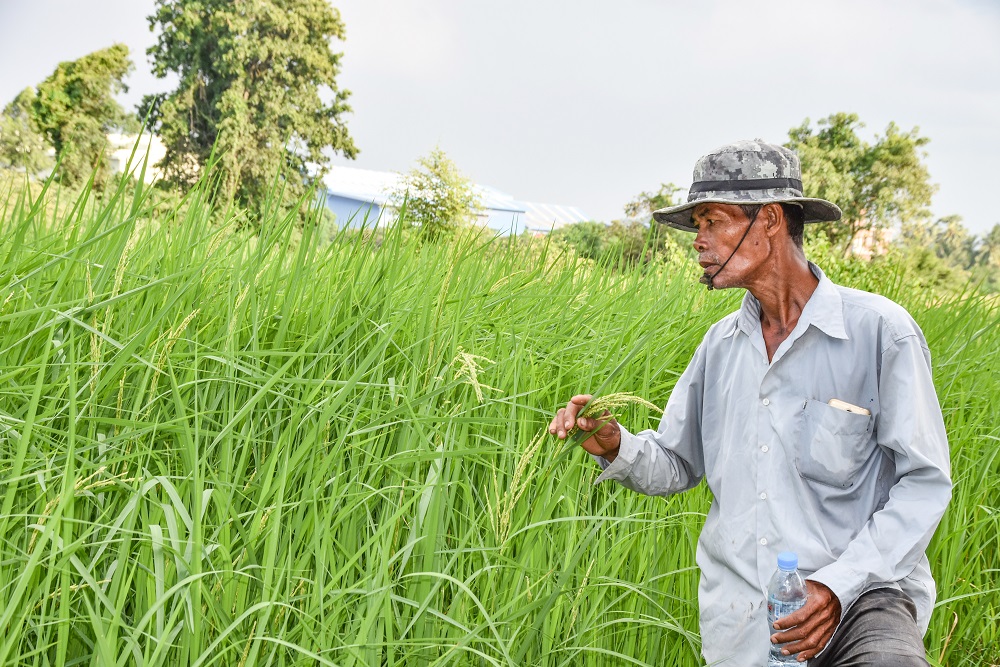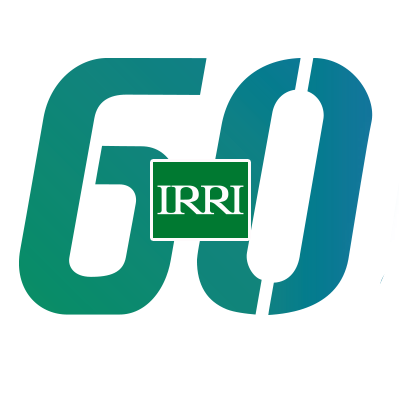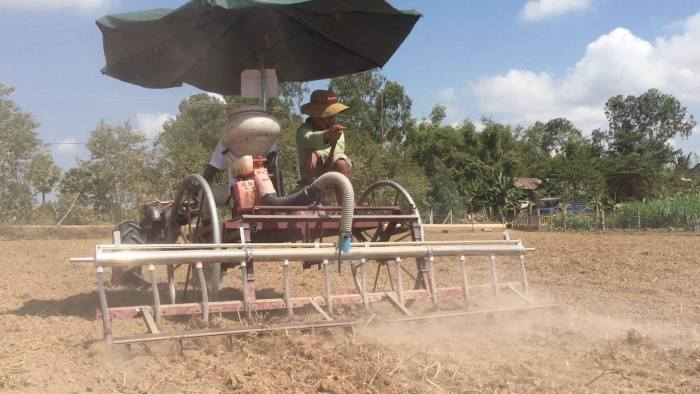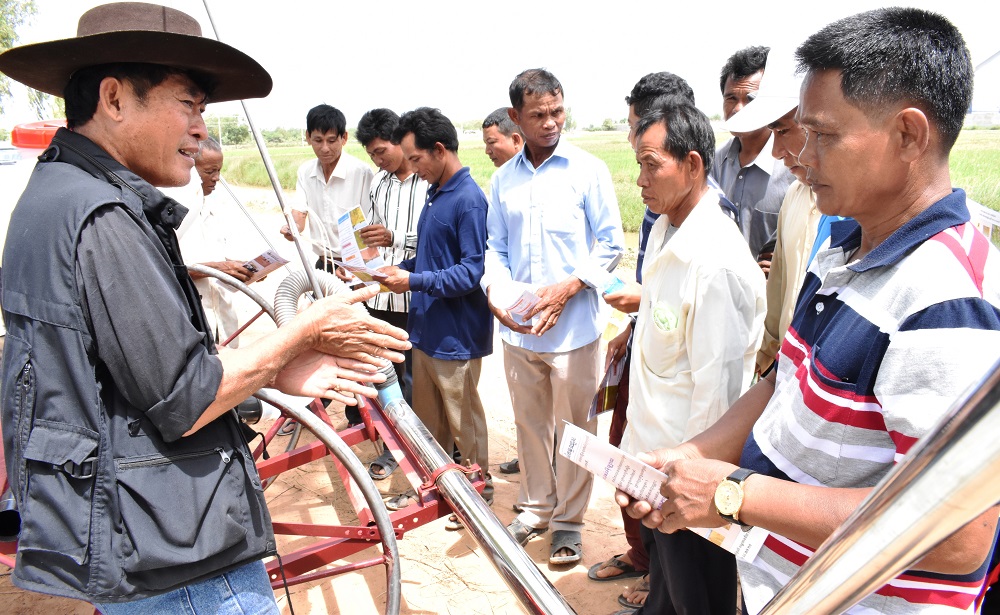One of the strategies to encourage farmers to adopt sustainable tools is building linkages between farming communities and the private sector. The IRRI-IPM Innovation Lab partnership hosts trade fairs to provide farmers with opportunities to access information.

Mr. Soun was the first one in his village to use a mechanized tractor in his fields that helped him achieved a healthy rice harvest. (Photo: IPM Innovation Lab)
.
 In Soun walks down the steps of his home in Battambang, Cambodia, where the sun is beginning to set. Three generations of his family follow behind, helping to carry large containers, rubber tubes, and over-sized wheels. To anyone else, the parts and pieces being laid out in his front yard might look like an obstacle course. But, to Mr. Soun, they are the tools that have helped him achieve the consistent and healthy rice harvest he’s always wanted.
In Soun walks down the steps of his home in Battambang, Cambodia, where the sun is beginning to set. Three generations of his family follow behind, helping to carry large containers, rubber tubes, and over-sized wheels. To anyone else, the parts and pieces being laid out in his front yard might look like an obstacle course. But, to Mr. Soun, they are the tools that have helped him achieve the consistent and healthy rice harvest he’s always wanted.
The parts and pieces belong to an Eli Rice Seeder. The mechanized tractor utilizes air pressure to shoot rice seeds directly into the soil replacing the traditional labor-intensive practice of broadcasting or transplanting rice by hand. Mr. Soun purchased the machine at a trade fair organized by the International Rice Research Institute (IRRI).
A toxic lack of information
Nearly 90% of cultivated land in Cambodia is dedicated to rice production. Because of its fertile fields, Battambang was coined as the “rice bowl” of the country. However, small-scale farmers like Mr. Soun continue to face a number of constraints including poor seed quality, pests and diseases, labor shortage, and limited access to productive technologies.
Low productivity and the desire to increase income often leads farmers to indiscriminate use of chemical pesticides with dire consequences. For example, in 2016, pesticide-contaminated streams and pond water poisoned 31 people, between 6 months to 40 years old, in Battambang’s Samlot District.
In the 2019 study, How do stakeholder interactions in Cambodian rice farming villages contribute to a pesticide lock-in?, one of the main knowledge gaps for farmers was found to be a lack of accessible, unbiased information that can help them identify pest problems. In many areas of Cambodia, the study found, the main source of immediate pest management information and recommendations are from pesticide retailers in farmers’ villages.
A partnership for sustainable rice production
Since 2014, the Feed the Future Innovation Lab for Integrated Pest Management (IPM Innovation Lab), housed at Virginia Tech, has collaborated with IRRI–through the Ecologically-based Participatory IPM for Rice in Cambodia (EPIC) project–to address constraints on sustainable production. The partnership, funded by the U.S. Agency for International Development, aims to improve rice production throughout Cambodia by testing and adapting sustainable, integrated pest management (IPM) technologies for the country’s farming communities.

The Eli Rice Seeder uses high air pressure to shoot the seeds into the ground at a uniform spacing of either 15 or 25 cm. (Photo: Agri-Smart)
.
One of the strategies to encourage farmers to adopt sustainable tools is building linkages between farming communities and the private sector. The IRRI-IPM Innovation Lab partnership hosts trade fairs to provide farmers opportunities to access information. At these events, IRRI partners and features companies like Agri-Smart, which develops the Eli Rice Seeder.
Bunika San is the Cambodia Country Director for Agri-Smart, which is supported by Brooklyn Bridge to Cambodia to innovate agricultural machinery.
“We are a small organization with limited funds to reach farmers,” said Mr. San. “We have an easier time contributing to the sustainability of farming when we collaborate with others.”
Farmers who live in remote areas are bussed to the trade fairs to visit the booths of local companies selling ecologically safe products such as bio-pesticides and rodent traps. Agri-Smart even offers discounted rates when farmers purchase their products at the events. Held on the same day as farmer field days, the trade fairs offer farmers and extension workers real-time observations of on-farm results of the locally-produced IPM products. They also hear from other farmers who have used the technologies on their farms.
“We get feedback from different users and stakeholders,” said Mr. San. “We have already sold four versions of the Eli Rice Seeder. A fifth one became recently available.”

Mr. San, the Cambodia Country Director for Agri-Smart (in dark jacket), explains how the Eli Rice Seeder works to farmers at a trade fair. (Photo: IRRI)
.
Dramatic impacts
The Eli Rice Seeder offers farmers significant benefits including dramatically reduced labor time, seed, fertilizer, and pesticide sprays, all of which can be costly. The machine plants seed in uniform rows that reduced Mr. Soun’s seed rates from 300 kilogram per hectare (kg/ha) to only 80 kg/ha. The rows make weeding easier and allow for mechanical weeding, which if applied, can significantly reduce herbicide applications.
The Eli Rice Seeder also helps farmers reduce fertilizer which, when applied in excess, can make plants more susceptible to pests and diseases. For Mr. Soun, the machine reduced fertilizer by 50 kg/ha. On average, farmers who have used the Eli Rice Seeder saved USD 250.00 per hectare, increased yields by 20%, and reduced labor time from 40 labor days to only 2 hours of planting.
In addition to helping farmers like Mr. Soun have access to productive, sustainable farming equipment, the IRRI-IPM Innovation Lab partnership has led to a number of other positive impacts. For example, an IPM publication has now been produced and distributed in Khmer, the official language of Cambodia. The knowledge can help farmers achieve certification for sustainably produced rice, which fetches higher prices in the market. Further, extension intermediaries from 16 Cambodian provinces and farmers from 4 provinces have also been trained on these practices. Currently, a calling service is being scaled up to offer farmers access to pest management information over the phone for free.

Mr. Soun shows his innovative sprayer for the Eli Rice Seeder for diffusing the biopesticide Trichoderma. (Photo: IPM Innovation Lab)
.
A farmer and an innovator
After experiencing the benefits of the Eli Rice Seeder, Mr. Soun saw even greater potential in the machine.
He commissioned local manufacturers to develop new attachments for the machine–hence, the obstacle course of parts and pieces in his yard–such as more efficient wheels and seed containers. The most productive modification he devised was a sprayer that could be attached to the Eli Rice Seeder for diffusing the biopesticide Trichoderma. Trichoderma, a naturally occurring fungus that helps boost plant immune systems against threats, can be purchased at low cost to farmers and poses no health risk to humans, animals, and the environment. The attachment is strategically placed to minimize any skin exposure.
The innovation reduced Mr. Soun’s chemical fungicide sprays to zero and cut spraying time from 2 hours per hectare to only 20 minutes.
“Farmers work very hard,” Mr. Soun said. “Innovating in these ways can help reduce the difficult work.”
A sustainable rice bowl
Mr. Soun is a model farmer in his community and was the first one in his village to use a mechanized tractor in his fields. He earns an additional USD 37.00 per hectare by using the seeder in his neighbor’s fields, who are also following his low seed and fertilizer rate.
“Soun’s use of the seeder is not just valuable for his current harvest, but for future harvests of his own farm and of his neighboring farmers,” said Virender Kumar, coordinator of IRRI’s IPM project in Cambodia and the Direct Seeded Rice Consortium. “Savings from input costs allow farmers to re-invest in more expensive, but better-quality inputs, such as pure rice seeds that are not contaminated with weed seeds.”
For more information please contact the authors:
Ms. Sara Hendery, communications coordinator, IPM Innovation Lab, Virginia Tech
Dr. Rica Joy Flor, scientist, IRRI Cambodia Office, Phnom Penh, Cambodia.







